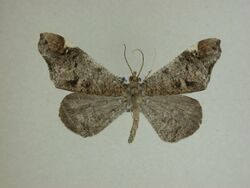Biology:Macrosoma cascaria
| Macrosoma cascaria | |
|---|---|

| |
| Scientific classification | |
| Domain: | Eukaryota |
| Kingdom: | Animalia |
| Phylum: | Arthropoda |
| Class: | Insecta |
| Order: | Lepidoptera |
| Family: | Hedylidae |
| Genus: | Macrosoma |
| Species: | M. cascaria
|
| Binomial name | |
| Macrosoma cascaria (Schaus, 1901)
| |
| Synonyms | |
| |
Macrosoma cascaria is moth-like butterfly described by William Schaus in 1901. It belongs to the family Hedylidae.[1] Originally it belonged to the genus Hyphedyle. Malcolm J. Scoble combined it with Macrosoma in 1986.[2]
Distribution
The species is found in Mexico: Xalapa, Tabasco and Misantla near the coast north of Veracruz to the northern Venezuela.[2][3]
Description
Wings
M. cascaria has wings of the ground colour which is more brown than greyish brown. The forewing has various brown-black markings and white triangular mark on costa; apex is chestnut brown.[3]
The length of the forewing is 19–26 mm.[3]
Genitalia
Male
Following are the characteristics of the male genitalia:[3]
- Saccus is fairly short.
- Gnathos with the central element is downcurved.
- Valva is subtriangular.
Female
The female genitalia has the following features:[3]
- The anal papillae is fairly short.
- Corpus bursae is elongated, broadening gradually from ductus.
- Signum is denticulate.
Antenna
The antenna is not bipectinate in both sexes.[3]
Diagnosis
The male genitalia are extremely similar to those of M. albifascia, but the chestnut apical patch in M. cascaria and the absence of the broad white forewing band make the two species easy to distinguish. The colour pattern is most closely resembles to that of M. paularia, but M. cascaria differs in having the white, costal patch and darker hindwings. The shape of the Gnathos also differs in having the medial element downcurved.[3]
Foodplant
The foodplant is Croton sp. of the Euphorbiaceae.[3]
References
- Macrosoma cascaria - Overview - Encyclopedia of Life.
- Catalogue of Life.
- A catalogue of the Hedylidae (Lepidoptera: Hedyloidea), with descriptions of two new species.
- An identification guide to the Hedylidae (Lepidoptera: Hedyloidea).
Sources
- ↑ Macrosoma cascaria - Overview - Encyclopedia of Life.
- ↑ 2.0 2.1 Scoble, M.J. (1990). A catalogue of the Hedylidae (Lepidoptera: Hedyloidea), with descriptions of two new species. Insect Systematics & Evolution, Volume 21, Number 2, 1990, Page: 113-119.
- ↑ 3.0 3.1 3.2 3.3 3.4 3.5 3.6 3.7 Scoble, M.J. (1990). An identification guide to the Hedylidae (Lepidoptera: Hedyloidea). Insect Systematics & Evolution, Volume 21, Number 2, 1990 , Page: 121-158.
Wikidata ☰ Q16448737 entry
 |

